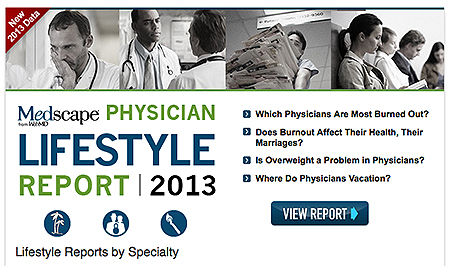Doctors give a lot of advice. But do they follow it? Medscape’s third survey about doctors’ habits shows that it all depends on who is wearing the lab coat.
As a run-up: WebMD Chief Medical Editor Michael Smith told MM&M in an interview about the survey that he takes a multivitamin, and Medscape Clinical Editor Laurie Scudder could not say either way—she’s part of a clinical trial in which she may or may not be ingesting a supplement—but can get back to us in five years when she finds out.
Around 8%, or 30,000 doctors, given the chance to participate provided answers, and they represent a variety of specialties. Those with a bias against dermatologists as the “beautiful people” will not be discouraged: Medscape found that these doctors were the least overweight of the 26 specialties, are the second happiest (behind ophthalmologists); and are among the top two specialists who rank their personal health as excellent (almost neck and neck with the eye guys).
At the other end are general surgeons and family medical doctors. They are the most overweight of the bunch (followed by gastroenterologists and critical care specialists) and are in the lower half of doctors who said they were happy, though like their dermatological peers, said they were happier at home than at work.
Within these poles, however, are some commonalties. The majority of overweight or obese doctors cleaved to the classic American diet, whereas underweight or normal weight professionals generally huddled more around diets like those recommended by the American Heart Association or the Mediterranean diet, and those who were heavier generally ate out more regularly than their under- or normal- weight peers.
What this means in the context of matching up doctors and patients: 34% of the surveyed doctors were overweight, and 35% of the US population is obese, but only 16% of the doctors said they were following a weight-loss diet.
In terms of personal health regimens, doctors popped vitamins just like everyone else, though women were higher users of complementary medicine than men, a category that includes supplements, massage and acupuncture among others. Normal and underweight doctors were the majority of professionals who exercised twice a week, while the obese and overweight…were less so, but were trying: 57% of overweight physicians said they exercised twice a week and 38% of obese physicians said they exercised twice a week.
WebMD’s Smith said the results may make an impression beyond a clinician’s office.
“I think one of the things that was the most striking to me, people sometimes like to put physicians up on a pedestal. I think what this lifestyle report really shows us is that doctors are people too,” he said, and noted that it’s also proof that knowledge is not what keeps people from following through on “good behaviors.”
Medscape’s Scudder said the use of alternative or complementary treatments also shows professionals are acting like their patients, and said the data indicated doctors were using complementary medicine for pain, which adds another layer to the report’s insight. “I think it probably speaks to a broader issue of deficiencies in pain management…people are looking for relief.”








